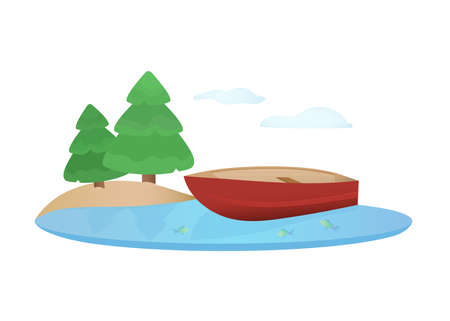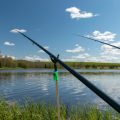Introduction to British Fishing Traditions
When it comes to outdoor adventures in the UK, few activities are as deeply rooted in local culture as fishing. From misty mornings on quiet riverbanks to windswept afternoons by rugged coastal cliffs, traditional British fishing methods have long been a cherished part of countryside life. These time-honoured techniques arent just about catching your supper—they’re woven into the fabric of British heritage, connecting generations of anglers across the nation. Even today, with modern gear readily available, many Britons still take pride in using classic approaches that have stood the test of time. Whether you’re wild camping in the Lake District or pitching up beside a Cornish stream, embracing these traditional methods offers a unique way to experience the UK’s natural beauty and its rich angling legacy.
Essential British Fishing Gear
If you want to truly immerse yourself in traditional British fishing on your next camping trip, getting your hands on the right kit is crucial. The gear favoured by seasoned anglers across the UK blends time-honoured craftsmanship with practical function—often passed down through generations. Let’s break down the must-haves for an authentic experience.
Classic Tackle: What Makes It British?
While modern technology has introduced many new options, classic British tackle holds a special charm and reliability. From centrepin reels to split cane rods, these items are more than just nostalgic—they’re built for performance on rivers, lakes, and even windswept coastal waters.
The Essentials at a Glance
| Gear | Description | Why It’s Traditional |
|---|---|---|
| Centrepin Reel | A simple, free-spinning reel perfect for float fishing and trotting baits downstream. | Favoured since Victorian times for its smooth control and direct feel. |
| Cane Rod | Made from split bamboo, these rods offer a classic feel and gentle action. | Once the gold standard before carbon fibre, still cherished by purists today. |
| Traditional Creel Basket | A woven basket used to carry your catch or essentials by the riverbank. | Iconic piece of kit seen in countryside angling scenes for generations. |
| Barbless Hooks & Hemp Line | Sustainable alternatives that respect both fish welfare and tradition. | Many British waters require barbless hooks; natural fibres echo historical methods. |
Don’t Forget the Accessories
No British fishing setup is complete without a flat cap or waxed jacket—practical for unpredictable weather—and a sturdy landing net. Many anglers swear by hand-tied flies or locally sourced bait, adding an extra layer of authenticity to your adventure.
Pro Tip: Where to Find Traditional Gear in the UK
While some tackle shops still stock these timeless pieces, you’ll often find gems at car boot sales or specialist antique markets. Don’t be afraid to chat with local anglers—they’re usually happy to share their knowledge about where to pick up the best vintage kit or recommend a trusted craftsman who restores old reels and rods.

3. Coarse Fishing on British Rivers and Lakes
Coarse fishing is a classic pastime for many British anglers and is perfect for those looking to enjoy the slower pace of rural rivers and lakes during their camping trips. This method targets freshwater species such as roach, barbel, bream, and perch—fish known for their spirited fight and abundance across the UK’s waterways.
Float Fishing: The Timeless Technique
Among the most cherished traditional methods is float fishing. Using a simple rod, reel, line, and a delicately balanced float, you can target species like roach and barbel with remarkable precision. The key is to adjust your float so it sits just right on the water’s surface, allowing you to detect even the slightest nibble. Maggots, sweetcorn, or bread are popular bait choices that have stood the test of time on British waters.
How to Pick Prime Spots
Success in coarse fishing often comes down to location. Look for gentle bends in rivers where the current slows, or seek out shaded overhangs and reed beds along lake margins—these spots often serve as natural fish highways. Early mornings or late evenings tend to be prime times when fish are most active and willing to bite.
Local Knowledge Goes a Long Way
If you’re new to an area, don’t hesitate to chat with local anglers or visit a nearby tackle shop for insider tips. Locals will know which stretches of river are producing and what bait has been working best—a bit of friendly advice can turn an average day into a memorable one. Coarse fishing in Britain isn’t just about the catch; it’s about embracing the peaceful surroundings and soaking up the local atmosphere while you wait for your next bite.
4. Sea Fishing Techniques Along the British Coast
If you’re planning a camping trip by the sea in the UK, embracing traditional British sea fishing methods is a brilliant way to connect with local culture and perhaps bag yourself a fresh dinner. Here’s an overview of tried-and-tested techniques that have been used for generations along Britain’s diverse coastline.
Beachcasting for Cod and Mackerel
Beachcasting is a classic method where anglers cast their lines far out from sandy or shingle beaches to reach species like cod and mackerel. This technique requires a sturdy beachcaster rod, heavy sinkers, and bait such as lugworm or squid. Timing matters—many locals swear by dusk or dawn when fish come closer to shore to feed.
| Species Targeted | Best Bait | Recommended Time |
|---|---|---|
| Cod | Lugworm, Peeler Crab | Winter Evenings |
| Mackerel | Mackerel Feathers, Strips of Fish | Summer Early Morning/Evening |
Rock Pooling: A Fun Family Activity
For those after a more relaxed experience, rock pooling offers an opportunity to discover smaller marine life like crabs, shrimp, and small fish in tidal pools. All you need is a small net, bucket, and a keen eye. It’s ideal for families or beginners wanting to explore Britain’s rugged coastlines without heavy gear.
Handlining from Harbour Walls
This simple yet effective method involves lowering a baited handline into the water from harbour walls or piers—a practice still favoured in many Cornish and Scottish towns. Handlining is portable, affordable, and surprisingly productive for species such as pollock, wrasse, and flatfish. Local anglers recommend using strips of mackerel as bait for best results.
Quick Tips for Coastal Fishing Success
- Always check tide times—fishing is often best on the incoming tide.
- Respect local regulations regarding minimum sizes and catch limits.
- Avoid slippery rocks and be mindful of changing weather conditions.
By trying these time-honoured British sea fishing techniques during your next camping adventure, you’ll not only enjoy a rewarding outdoor activity but also gain a true taste of traditional coastal life in the UK.
5. Fly Fishing the British Way
Fly fishing is a quintessentially British pastime, often associated with tranquil rivers and rolling countryside. In the UK, fly fishing is most commonly practised for trout and grayling, especially in the chalk streams of southern England and the wild rivers of Scotland and Wales. If you’re keen to experience traditional British fly fishing on your next camping adventure, here’s what you need to know.
Essential Flies for British Waters
Success in British fly fishing starts with the right flies. Classics like the Pheasant Tail Nymph, Greenwell’s Glory, and the Blue Winged Olive are staples in any local angler’s box. For grayling, try patterns such as the Klinkhammer or Red Tag. Local tackle shops or fellow anglers are always happy to recommend the best flies for the season and water you’re fishing.
Casting Styles: Mastering the Art
The British approach to casting values precision and subtlety over brute force. On smaller streams, a gentle upstream cast helps present your fly naturally, while larger rivers might require longer roll casts or even spey casting techniques. Take time to observe local anglers—there’s often a wealth of knowledge in their understated style.
Etiquette on the Riverbank
Fly fishing in Britain comes with a strong sense of etiquette. Always seek permission before fishing private waters—most rivers require a permit or day ticket. Keep noise to a minimum, respect fellow anglers’ space (leave at least one pool between you), and avoid wading unnecessarily, as this disturbs both fish and habitat. Many beats operate a ‘catch and release’ policy, particularly for wild trout and grayling, so handle fish carefully and return them swiftly.
Practical Tips for Campers
If you’re camping near a river or lake, plan ahead by checking local regulations and picking up permits where required. A light 3–5 weight rod will cover most situations, and don’t forget your wellies—British banks can be muddy! Finally, enjoy the peace: dawn or dusk sessions not only offer superb sport but also showcase Britain’s natural beauty at its finest.
6. Fishing Etiquette and Conservation in Britain
If you’re planning to try your hand at traditional British fishing methods on your next camping trip, understanding local etiquette and conservation practices is just as important as mastering the techniques themselves. The British countryside is rich in angling heritage, but with this comes a set of unwritten rules and responsibilities that every visitor should be aware of.
Respect for Local Customs and Anglers
British anglers take pride in their traditions, so it’s good form to greet fellow fishers with a nod or a friendly “alright?” when passing by. Always give others plenty of space—crowding someone else’s swim is a big faux pas. If you’re unsure about the accepted local practices, don’t hesitate to ask; most regulars are more than happy to offer advice or guidance.
Understanding and Following Local Regulations
Fishing regulations can vary widely across different regions and waters. Most rivers, lakes, and canals require an Environment Agency rod licence, even for visitors. Certain species have closed seasons, and some areas are catch-and-release only. Check for signs or consult with local tackle shops before setting up. Ignorance isn’t an excuse—fines for breaking the rules can be hefty.
Protecting the Environment
Conservation is at the heart of British fishing culture. Always take your litter home, use barbless hooks where recommended, and avoid disturbing wildlife habitats along the banks. Many seasoned anglers carry a small rubbish bag to pick up after less considerate visitors—a small gesture that goes a long way in preserving these beautiful spots for future generations.
The Spirit of Fair Play
Above all, fishing in Britain is about sportsmanship and stewardship. Whether you’re float fishing for roach or stalking trout in a quiet stream, remember that you’re sharing these waters with others—human and animal alike. By respecting the land, its creatures, and your fellow anglers, you’ll not only get the most out of your adventure but also earn the respect of those who call these fisheries home.
7. Combining Fishing with Your Camping Adventure
Making the Most of Both Worlds
Blending traditional British fishing methods into your camping trip isn’t just about landing a catch—it’s about experiencing the outdoors in true British style. Whether you’re casting a float on a misty morning or trying your hand at ledgering by the riverbank, integrating fishing with camping brings a whole new level of adventure to your holiday.
Practical Tips for Seamless Integration
- Plan Ahead: Research local waters and regulations before setting off. Many British lakes and rivers require a rod licence and may have specific rules about bait or catch limits. The Environment Agency website is a good place to start.
- Pack Smart: Choose compact, traditional tackle like telescopic rods or collapsible landing nets that won’t take up too much space in your kit. A simple bait box and a small selection of hooks, floats, and weights will cover most situations.
- Choose Your Spot Wisely: Opt for campsites close to fishable waters—many in the UK are located right beside rivers or lakes. This makes early morning or late evening fishing sessions easy and convenient.
Campfire Cooking: The British Way
- Preparation: If you’re lucky enough to catch something, remember to dispatch it humanely and clean it thoroughly by the water’s edge (where allowed).
- Simple Recipes: Traditional campfire favourites include wrapping fish in foil with butter, herbs, and a squeeze of lemon, then placing it over hot embers until cooked through. Or try grilling your catch on a stick for a rustic treat.
- No Trace Left Behind: Always dispose of fish remains responsibly—either bury them well away from water sources or use designated bins if available.
Safety First: Essential Advice
- Be Weather-wise: British weather can change quickly. Dress in layers and keep waterproofs handy. Slippery banks can be hazardous after rain, so tread carefully.
- Campsite Rules: Follow any site-specific guidance about fires and fishing access, and respect other campers’ space—especially when casting lines near communal areas.
- Sustainable Fishing: Only take what you need for your meal and practise catch-and-release where possible to help preserve local fish stocks for future generations.
A True Taste of British Tradition
Bringing together classic angling methods with the pleasures of camping creates an unforgettable outdoor experience steeped in local heritage. By preparing thoughtfully, cooking up your fresh catch over an open fire, and respecting nature’s balance, you’ll enjoy your adventure just as generations of British campers have before.


